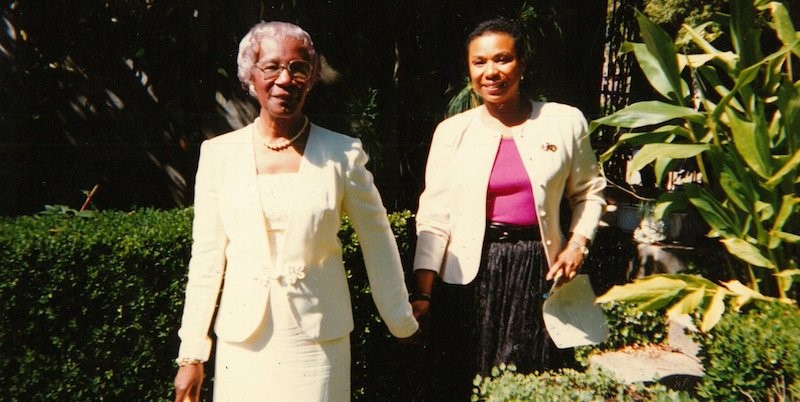
On Wednesday, January 26, 2022, Chief News Editor of The Campanil, Tashandra Poullard, interviewed proud Mills alumna and California Congresswoman Barbara Lee ’73. They talked about race, gender and politics.
Mills College has a rich history of gender equality and social advocacy, serving as a pivotal point in cultural and political forces that helped shape the city of Oakland, CA. Black students at Mills College have long pushed for academic and social equity with limited success; Congresswoman Barbara Lee was elbows deep in the thicket of change at Mills, fighting for social justice and systemic change from her start.
Lee opened the interview by reminiscing on her time at Mills, and sharing pictures highlighting her bond with the first African-American woman elected into the United States Congress, Shirley Chisholm (November 30, 1924 – January 1, 2005).
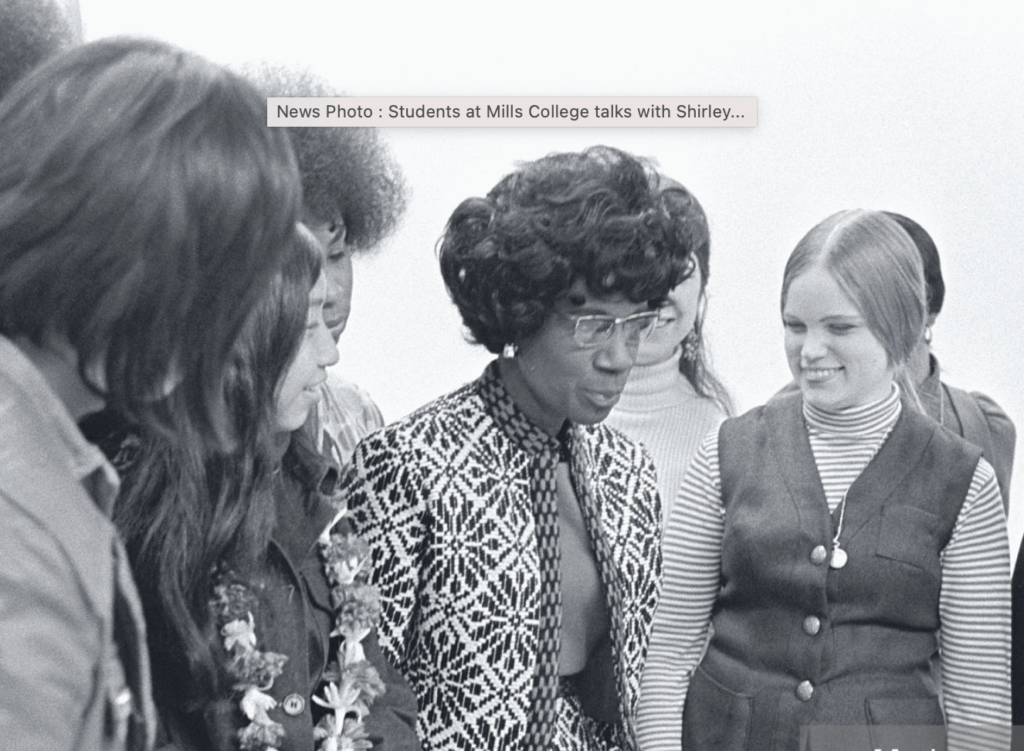
“You can barely see me peeking, I’m peeking around her [Shirley Chisholm] body, I have a big afro, and I’m smiling. I was too modest to Bogart my way in, but everybody knows it’s me,” Lee said, laughing playfully via our Zoom conference.
Lee’s personal assistant chimed in about a conversation they had recently about the chance meeting between Lee and Chisholm, a connection that led to the creation of a strong working bond between the two.
Lee is the highest-ranking Black woman in the U.S. Congress. She serves as a member of the House Appropriations Committee, Chair of the Subcommittee on State and Foreign Operations, Co-Chair of the Steering & Policy Committee, and Chair of the Congressional Black Caucus.
And she jumpstarted her political career right here at Mills College.
“I was president of the Black student union. The Black young women were out there,” Lee said. She worked with the Black Panthers in the city of Oakland, fundraising for their Free Breakfast for School Children Program, which fed thousands of children from 1969 into the early 1970s.
“Mills College helped with that financially through the Black Student Union (BSU),” Lee said. “I had a budget of about eight or nine thousand dollars. I then took some of that money and supported community projects, and one of them happened to be the breakfast program.”
Today, the BSU at Mills has been renamed as the Black Student Collective. Its stated mission is to connect and empower black students of Mills College “through educational and community engagement opportunities.”
Lee’s contributions to Black excellence in historical activism include serving as research assistant for Dr. Herman Blake, a former professor at Mills, during his time writing an autobiography of Black Panther founder Huey P. Newton. Titled “Revolutionary Suicide,” the book details Newton’s troubled childhood in the city of Oakland, his role in the Black Panthers and his solitary confinement in the Alameda County Jail.
“I would go to the library and go through all the New York Times articles [on microfiche] and what have you, and he gave me a little bit of credit at the front of the book,” Lee said.
During the interview, Lee relived her organization of the release party for Newton’s autobiography, at a black woman-owned nightclub/cultural center called The Rainbow Sign.
“It was a nightclub, like a cultural center, where Nina Simone performed, all the great Black artists came here, it was right on the board of Berkeley and Oakland,” Lee recalled. “So I had a party for Huey Newton sponsored by the BSU.”
Lee was also the Student Recruitment Coordinator in the Mills President’s Office, where she recruited Elaine Brown, during Brown’s time running for city council, to be a student at Mills College. Elaine Brown is an American prison activist, writer and singer who unsuccessfully ran for election to Oakland City Council in 1973 and 1975. Brown became the first and only woman appointed chairperson of the Black Panther Party (1974 –1977) after Newton fled to Cuba in 1974, avoiding murder charges.
Brown dealt with regular sexism from Black men within the party, who were angered over taking orders from a woman. She wrote in her 1992 memoir, “A Taste of Power”:
“A woman in the Black Power movement was considered, at best, irrelevant. A woman asserting herself was a pariah. If a black woman assumed a role of leadership, she was said to be eroding black manhood, to be hindering the progress of the black race. She was an enemy of the black people.”
Lee referred back to Brown’s memoir when giving her thoughts on the causes of the discrimination that Black women in leadership roles face.
“It’s racism and sexism — they know who are are and they are afraid of us, I think,” Lee said. “Here we are in terms of our strength, our brilliance, our experiences; we have been contributing [to laws] since 1789! Think of how much better America would be if Black women were at the table? If Black women were making these policies? Thank God for Fannie Lou Hamer , Sojourner Truth, Ida B. Wells and all those who came before me to pave the way. They went through hell, and look at how they were treated.”
Lee finds that the unconscious structural issues of racism and sexism in society make it difficult for many to consciously process the strength of African American women, who “survived 250 years of slavery.” She believes that Black women are saying “no more” with President Biden’s nomination of Judge Ketanji Brown Jackson to the Supreme Court. This marks the first time a Black woman has been elevated to the nation’s highest court in its 232-year history.
Lee expressed that she wanted to make sure, as president of the Black Student Union, that Mills College wasn’t isolated from the community. She worked hard to bring the community of Oakland into the fold of Mills culture.
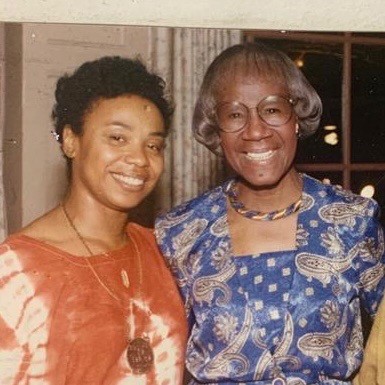
“Now that I’m reflecting, and we’re talking, I did a lot of stuff. But the Black students at Mills College were organized,” Lee said. “We had a student president who was Black, Sandy Gains, and we made a big difference in the community.”
Taking a brief pause and examining the work that Mills College has done for the advancement of people of color in the Bay Area, Lee attributed the successful advocacy work to its rigorous academic curriculum, and the flexibility it allows for students to actively engage in fieldwork, political internships and unbeatable real-world experience.
When focusing upon her work with Congresswoman Chisholm during her time at Mills, Lee shifted to a more sentimental tone.
“The only government class I’ve ever taken in my life was at Mills College,” Lee said. “Part of the requirement was to do fieldwork in a presidential campaign. And that was the only class that I was gonna flunk because that’s when McGovern, Humphrey, and Musky were running.”
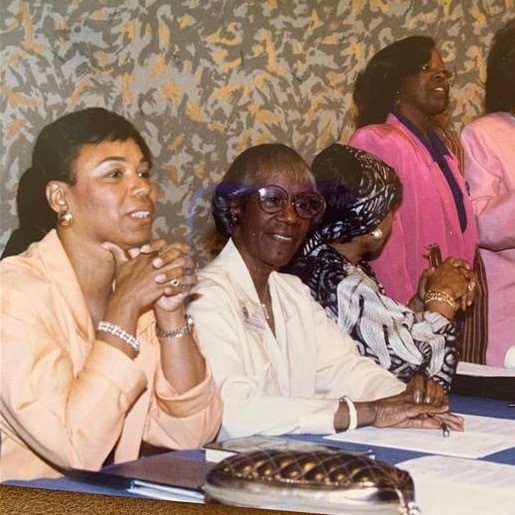
Lee knew that neither of these middle–aged white men would give a Black single mother the chance to gain real-world experience in politics.
“These guys didn’t have anything to do with my life. A Black woman, on welfare, raising two small kids, a single mom struggling every day to make ends meet, to take care of their child care,” Lee said. “My kids went to school with me. They sat through statistics twice, because I couldn’t afford child care.”
During this period, Lee accepted the idea of failing that government class because she knew these white men did not speak to the needs and aspirations of Black women.
Things took a dramatic turn when Lee invited Congresswoman Chisholm to Mills College, as the first Black woman elected to Congress. Lee stated, “I had no idea she was running for president. I just knew that I was getting ready to flunk this class.” When Chisholm revealed that she was running for president, Lee said Chisholm “took her to task” on registering people to vote.
“She [Chisholm] said to me, if you are really revolutionary, and you really believe in what you say, then you have got to help us organize politically. And she said I would love to have you in my campaign,” Lee said.
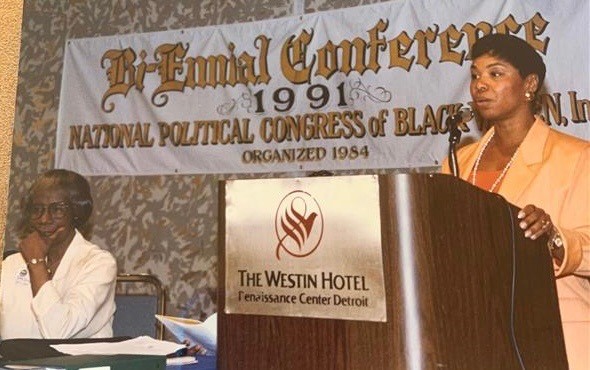
Congresswoman Chisholm spoke fluent Spanish, stood for equal rights, tackled tough issues related to poverty, and opposed the Vietnam War.
“She was exactly what I thought a presidential candidate should be,” Lee said. She went to Sandy Gains and Wilson Riles Jr., who later became Lee’s Chief of Staff in Congress, and they organized the Shirley Chisholm Presidential Primary Campaign out of Lee’s class at Mills College.
“If it had not been for Mills, I don’t think I would be where I am now,” Lee said. “Mills gave me a chance to learn politics, and I had to learn it from scratch, from the ground up. And I don’t think any other college would have afforded me that opportunity.”
Her professor assisted her with learning how to make the theories and practices of politics applicable to the Chisholm presidential campaign. This laid the foundation for her own career in politics, and her later successful run for Congress. Shirley Chisholm was the first Black woman elected into Congress in the late 1960s, while Lee is only the 20th Black woman elected into Congress since 1789.
